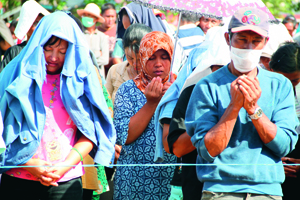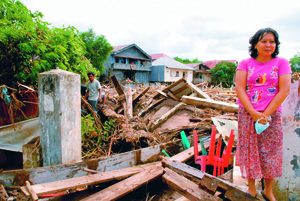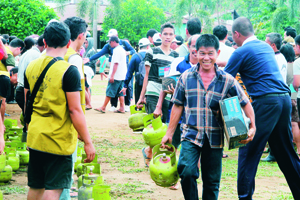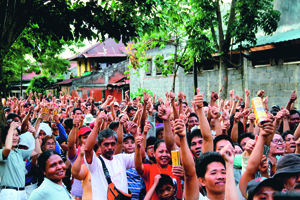

| The Manado Flood | ||||||||||
| By Tzu Chi documenting volunteers in Indonesia Translated by Tang Yau-yang Photos by Metta Wulandari | ||||||||||
Manado, Indonesia, suffered the worst flood in its history earlier this year. Many victims believed that it was all heaven’s will, and though their houses were damaged or destroyed, they were quite thankful that their loved ones were not hurt. They were also very grateful for Tzu Chi’s help through the hard times.
Horrendous floods raged through Manado, the capital city of North Sulawesi Province, Indonesia, in January 2014. About 10,000 buildings were damaged or destroyed, and 85,000 people were impacted. Tzu Chi volunteers from nine other Indonesian cities provided relief. They distributed aid goods, conducted free clinics, and initiated work relief programs to help clean up ravaged neighborhoods. Dince, about 50, was one of the work relief participants. As she shoveled away the mud in front of her house, she sang a song she had composed in a local dialect: “The floods in Manado left me with nothing but the clothes on my back. There was no time to take anything away. All our possessions, we had no choice but to let them be submerged. It’s all heaven’s will. We went along with it, and we’re thankful that we’re safe and sound.” Despite being a flood victim herself, Dince displayed an optimistic attitude towards her suffering. Earlier, when she had stood among a thousand residents listening to Tzu Chi volunteers for instructions about the cleaning task ahead, she had said with cheerful confidence: “Don’t feel sorry or lost. We’re all still agile. It’ll do us good to do some work. Sitting around doing nothing only makes you blue.” Many of her fellow villagers shared her upbeat outlook—they felt lucky to be alive and chose to face life’s trials positively. Antonette, another victim, still felt quite frightened as she recalled the moments when the floodwater rose rapidly in her home, threatening the nine people in her family. But even though she and her family had lost their belongings to the flood, she was, like Dince, quick to look on the bright side. She was grateful for not having lost any of her family during their last-minute scramble for higher ground. She also appreciated the assistance from her church friends and Tzu Chi volunteers in the wake of the flood. “I’ve never blamed anybody for this because it’s God’s will,” Antonette said with gratitude. “Don’t get me wrong; it’s hard to have been hit by the flood. But we should look at it another way: We’ve received help from many people, such as children rushing back from out of town to help. Even people of other faiths have given us a hand. We all live on the same Earth under the same sky. We’re all in one large family.” Accept what can’t be helped Damage is commonplace in Indonesia during the rainy season, year after year. After floods hit again at the beginning of this year, Tzu Chi volunteers in Jakarta immediately began providing relief for victims there. On January 18, they flew additional relief supplies on military aircraft to Manado, three hours away, to help more flood victims there. The coastal city of Manado is surrounded by hills. The heavy rains in January caused mudslides and breached river dikes, resulting in horrendous flash floods seven to ten meters (23-33 feet) deep. There were no local Tzu Chi volunteers. One resident quipped, “The floods brought Tzu Chi volunteers to help us.” In the village of Karame, volunteers provided free clinics, distributed daily supplies, and offered a cash-for-work cleanup program.
Alfreds Kinsal, a 61-year-old flood survivor, led volunteers to his home. The roads were covered in thick mud with piles of garbage strewn all along the way. Alfreds Kinsal told the volunteers about the day when the flood began. On January 15, everyone was going about their business as usual. But at 8 a.m., the flood suddenly came, seemingly from nowhere, catching everyone off guard. “I got home and saw my wife busily cooking in the kitchen, unaware of what was happening. I told her to get out. I tried to pack a few things, but the water rose so quickly that it was soon up to the ceiling. I scrambled to the top of the roof to save my life.” Before the flood, Alfreds Kinsal worked as a public bus driver. He didn’t want to be a burden to his children. “They have their own expenses, and it’s tough to make ends meet,” he said. His house had sheltered four generations of his family, from his parents to his grandchildren. Sadly, the flood robbed him of everything he had. He did not even have a change of clothes; all he had left were the clothes that he had on. After the flood, his home was nothing more than a bare frame. Everything else had been washed away. “It’s not going to be easy to rebuild,” he lamented. Even so, he did not complain. “If the flood is what heaven intended, then we just have to accept it,” he commented. “I’m content just to be well. Compared to people who are bedridden, I’m lucky enough—I can still move around and work.” His optimism was echoed by Chyntia, who had taken refuge at a shelter after the flood. She brought volunteers crispy banana treats that she had deep-fried in the shelter kitchen over a wood fire. “These volunteers have come a long way to help us. How can we not share what we have?” A devoted Christian, she believed that all their tribulations were temporary. “Why should we be sad? The good Lord must have something better in store for us.”
Work relief In early February, when most Chinese people around the world were still celebrating the Lunar New Year, Tzu Chi volunteers, most of whom were ethnic Chinese, visited Manado again. They went to Banjer, Tikala, and PAAL IV to visit flood victims, distribute aid, and offer a second round of work relief. About a thousand people gathered each morning from February 3 to February 8 to clean up their neighborhoods. Though three weeks had passed since the disaster, many places were still covered in muddy water. Volunteers provided tools such as shovels and wheelbarrows to help the participants do a more thorough job of clearing garbage and dirt from their streets and drainage ditches. Machinery, such as excavators and dump trucks, was also on hand to do work that was too heavy for humans.
On February 7, nine thousand city employees and police worked to clean up Tikala and Wenang. “For a while now, Tzu Chi has provided work relief cleanup campaigns in areas most severely damaged by the flood,” Manado Mayor Vicky Lumentut said. “In the next couple of days, we’ll devote our attention to just these two areas. We hope that life may quickly return to normal for the residents.” The big trucks that volunteers had arranged chipped away at the mounds upon mounds of garbage. By and by, the streets began to show signs of life. Pedestrians and cars began to add sounds to the scene. Long lines of vehicles waited to go through. Volunteer Yoppie (陳亞福) was directing traffic in the middle of a road when he heard a driver ask, “Where is your group from?” He bent forward and lowered his head toward the driver. Pointing at the Tzu Chi logo on his cap, he told the driver about the work that the foundation did. The driver gave him a thumbs-up. Other charitable groups had distributed food earlier, but many of the victims could not cook it because their stoves had vanished in the flood along with their other belongings or were buried in mud. Tzu Chi volunteers and village heads visited victims at their homes to assess their needs, and they gave each family a claim check for a gas stove and a gas tank, which would be distributed later.
Albert Lengkong and Ido Kosangit declined the offer when volunteers presented a claim check to them at their home. “Our stove was repaired, so please give this to another family that needs it more,” they explained. The volunteers gave out 4,188 gas stove claim checks as a result of the house-to-house visits. Mayor Lumentut commented that Tzu Chi’s relief goods would make the daily lives of his people easier. “With help from Tzu Chi, their good spirits have returned,” he said. By February 17, 2014, the volunteers had paid 7,784 daily wages to work relief participants, treated 1,868 patients, and distributed 6,889 packs of daily necessities, 4,188 claim checks for gas stoves and tanks, and 2,594 sets of cleaning supplies. The gas stoves and tanks were given out on February 28 and March 1. Tzu Chi’s work relief cleanup program in Manado came to a close on February 8. “Thank you for your help,” Vian, one of the participants, said to volunteers. He could not contain his tears. More than money (about US$10 for a day’s work), the volunteers had given participants warmth and a measure of confidence to face the future. “Volunteers also reminded us to help others who are still experiencing difficulties,” Vian observed. “As long as we’re sincere, our small donations are meaningful, too.” The volunteers had hoped to convey to the victims the idea that small donations can make a huge difference when pooled together. The Tzu Chi volunteers handed out coin banks that work relief participants would pass from one person to the next and deposit donations. The victims were enthusiastic in their giving. Though they had lost a lot to the flood, their hearts were rich from giving. May they continue to face life with a smile.
Information provided by Metta Wulandari, Juliana Santy, Teddy Lianto, Aprisanny Angeline, Donny Hidayat, and Muhammad Syahri |
















|





